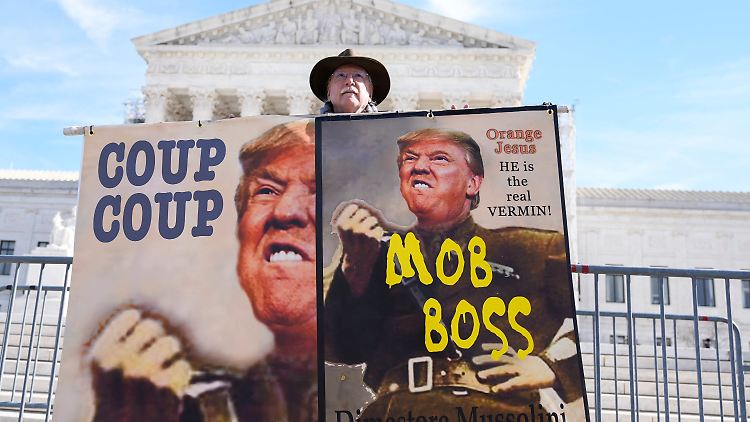Electoral exclusion or not?
Trump’s defense is almost rock solid
By Roland Peters, New York
February 8, 2024, 10:58 p.m
Listen to article
This audio version was artificially generated. More info | Send feedback
Can Donald Trump become US President again? The Supreme Court could have asked many questions at once and saved the United States a lot of confusion leading up to the election. But the judges limit themselves to something else. Trump’s lawyer cuts a fine figure.
There is no verdict yet. But the content, as well as the manner in which the chief justices in Washington, DC, asked their questions to Donald Trump’s lawyers and the plaintiffs, already leads to a cautious conclusion: the Supreme Court is not inclined to leave it up to the states, Trump to be excluded from the primaries for the 2024 presidential election. Colorado had done this, and Maine also took this step. Trump’s right to stand as a candidate was questioned in at least 35 states.
Colorado’s Supreme Court had deemed it proven that Trump should not be elected. Finally, he supported the insurgents of January 6, 2021 in their attempt to prevent the confirmation of US President Joe Biden’s election victory when they stormed the Capitol. A constitutional amendment therefore prohibits the former office holder from being sworn in again. Did the judges make the wrong decision?
This is the question that the Supreme Court of Washington, DC must now decide for its part. When hearing the arguments, the judges were particularly skeptical about the arguments of the six plaintiffs from Colorado. They repeatedly probed and sometimes treated lawyer Jason Murray like someone who was too green behind the ears. Trump’s representative John Mitchell, on the other hand, made a very confident impression.
Too much power for the states?
In the two hours of the hearing, Mitchell is the first to be grilled. Trump’s representative is convinced that it is the wrong time to decide whether Trump should be allowed to hold office. In addition, it is not the Supreme Court that is responsible, but rather Congress in the event of an election victory. Only he could prevent Trump from being sworn in or remove him from office. After all, it is excessive for a federal state to interpret the constitutional law of the entire country and thus potentially decide for everyone else.
Almost everything in the debate revolves around Section 3 of the 14th Amendment. It states that no person may hold office again who has been a “member of Congress,” an “officer of the United States,” or a member of the legislative, executive, or judicial branches of any of the states, and who, despite his oath to the Constitution, abides by it participated in an uprising or rebellion against them or supported its enemies. Trump’s lawyers argue that this does not affect their client. The president is more than an “officer of the United States.”
But isn’t it strange that only the president and his deputy are not explicitly mentioned in this list, even though he has the most power in the state, asks a judge – and thus implies that a head of state, as a possible enemy of the constitution, is also the greatest danger would be for democracy. “It seems strange that the president falls through this crack, but that’s just how it is,” Mitchell said at one point. One of the judges asks how he would argue that Trump is not an insurrectionist? According to Mitchell, it was not an organized revolt, but chaotic. The ironic question: “Because it was chaotic, so it wasn’t an uprising?”
When would a verdict cause more chaos?
Then it’s Murray’s turn, and now some of the judges are getting really snappy. Murray argues that states can virtually hold their elections however they want, which is covered by the Constitution. At some point, he’ll ask the Supreme Court to determine what counts as insurrection. Later, a representative from Colorado will say that insurgents should be barred from voting at the state level based on the constitutional amendment – as well as other criteria such as age or citizenship.
Several judges doubt this. If each state could decide for itself whether someone still had the right to vote, it would no longer be manageable. Murray counters that it would be even more chaotic if the court only decided whether someone could hold office after they had already been elected. “This would disenfranchise voters and create a constitutional crisis.”
That’s why we need an answer quickly, demands the plaintiff’s lawyer. “So everyone can be sure before they vote.” Ultimately, it’s about protecting the democratic system and not giving the same people back to power. “That’s why we’re here, because Trump wanted to disenfranchise 80 million voters.”
In the end, the judges first let the legal representative of the election authority in Colorado have their say. There are mechanisms for determining whether someone is allowed to hold office or not, she explains – “if in doubt, this court.” Colorado has the authority not to admit applicants and candidates. The state also excluded someone in these primaries because they are not a US citizen: “It’s a feature, not a bug, your honor.”
The Supreme Court had never before addressed the question of a possible presidential candidate who might have been involved in an attempted coup. Judging by the questions, the court most likely won’t rule on that at all – but only on how far the legal powers of the states extend in nationwide elections. Both sides expect a quick verdict because the USA is in the middle of an election campaign. Super Tuesday, when Colorado and many other states hold their presidential primaries, is March 5th. By then the supreme justices will have announced their decision.

